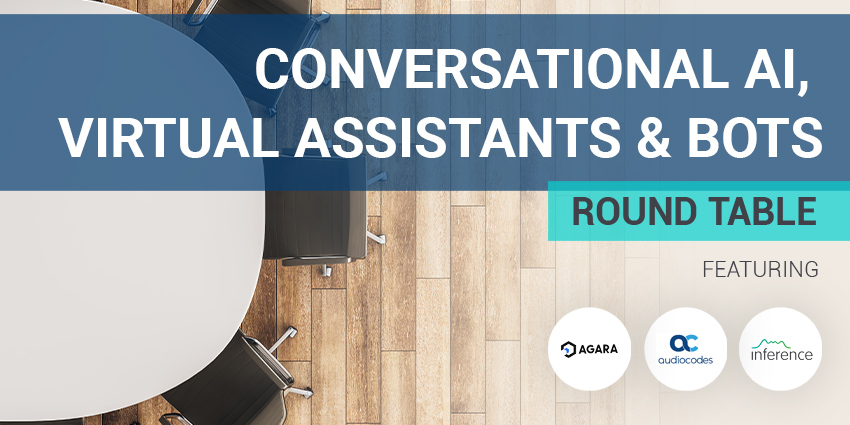Delivering a fantastic customer experience today is a lot more complicated than it used to be. Consumers expect their favourite companies to deliver personalised and relevant experiences on all of their preferred channels. Your clients don’t have the patience to wait for you to answer their questions, and if you can’t make them feel special in every conversation, you risk losing their loyalty.
Artificial Intelligence has emerged as a popular solution to a variety of customer engagement problems. Around 83% of teams say that AI is one of the main tools they’re using to deliver better CX to customers. However, there’s more than one form of AI.
Conversational AI, which promises more immersive experiences for customers through personalised messaging, virtual assistants, and chatbots, promises to be a valuable opportunity for the teams that know how to leverage it correctly. Virtual assistants could deliver results to customers faster, while providing agents with more contextual information on a call. We spoke to leaders from Agara Labs, AudioCodes, and Inference Solutions to get their insights into this landscape.
Regarding the Modern Contact Centre and Conversational AI, What are the Biggest Challenges Faced Today?
Today’s contact centres are under more pressure than ever to deliver meaningful experiences in an environment where more consumers are embracing the digital world. Clients are searching for innovation from the brands they buy from, with 57% of consumers saying that “change” is crucial for better customer experience.
We asked our experts, in relation to the conversational AI and contact centre landscape, what are the biggest challenges currently faced?
 Abhimanyu Singh, Co-Founder and CEO of Agara Labs:
Abhimanyu Singh, Co-Founder and CEO of Agara Labs:
Co-Founder and CEO for Agara Labs, Abhimanyu Singh told us that contact centres need to cater to customer expectations quickly today, while adhering to guidelines for public safety, and protecting employees. Since the pandemic, contact centres across various verticals are taking on a huge selection of new challenges.
Singh told us that the biggest challenges include: “A surge in call volumes, anxious customers searching for quick resolutions and reassurance, and repetitive queries, often resulting in extended wait-times and customer churn.”
At the same time, companies are also contending with a reduced workforce, lower operational efficiency, and dropping customer satisfaction levels as they struggle to handle an avalanche of requests. Business leaders are struggling to deal with staff requirements during the peaks of business demand too.
 Andy Elliot, VP of Marketing and BD EMEA for AudioCodes:
Andy Elliot, VP of Marketing and BD EMEA for AudioCodes:
The VP of Marketing and BD for EMEA at AudioCodes, Andy Elliot said that the biggest challenge for many contact centres right now, is adapting to the increasingly competitive modern world.
“This has two sides. Firstly, competition to recruit and retain skilled resources. By offloading transactional tasks to voice bots / voice AI technology, skilled agents can spend more time doing work that they value with customers. Secondly, contact centres are competing to provide ever higher service levels.”
Elliot told us that today’s consumers are more demanding, and less patient. Voice AI and conversational tools can accelerate a range of customer service tasks through automation, and deliver the speed that companies need. However, companies are still facing challenges in adopting the right technology. Issues with input quality, language understanding, accents, and cultural communication differences are common.
“Spoken language is a complicated area, so companies have to find voice AI solution providers that can connect their very specific use case with the right AI technology and work closely with them to get it right.”

Callan Schebella said that the biggest barriers keeping many mid-sized and smaller organisations from deploying virtual agents and conversational AI in the contact centre are cost and complexity.
“Custom applications were needed for such tasks as natural language processing and text-to-speech, requiring big upfront spending along with ongoing maintenance. You needed to hire or contract with some serious technical expertise to get the job done, and that added greatly to the cost as well as the time commitment.”
Schebella told us that the perceived complexity means that many contact centres are still using outdated technology to provide self-service opportunities today, which creates a frustrating customer experience. Cost, and reliance on professional services were some of the top barriers to automation mentioned in a survey of IT decision makers recently.
What Needs to be Done to Address These Challenges?
While embracing new technology in the contact centre can be a challenge in itself, there’s a lot of opportunity out there for companies that are willing to evolve. The right conversational AI solutions could be the key to delivering a high quality of customer experience to end users. They could also be essential components in creating a more “differentiated” brand.
We asked our experts what they believed companies needed to do to address the current challenges they face with contact centre performance, and conversational AI.
Abhimanyu Singh told us that as conversational AI continues to evolve at incredible speeds, it’s likely that consumers and businesses alike will benefit from this self-service over voice solution. Businesses need to drive adoption of conversational AI opportunities, increasing the potential quality of interactions between brands and customers.
“Voice AI has the capability to personalize customer interactions and provide zero wait time instant responses 24/7” according to Singh. However, organisations need to understand baselines and get clearer pictures of issues that might lead to poor experience over voice. Companies also need to identify high-velocity use cases which are suitable for automation, and map out conversational journeys, with insights into possible points of failure.
Abhimanyu recommends:
“Taking advantage of conversational AI to understand customers need and help them route to a point of resolution depending on use case (autonomous or assisted) and personalize these responses and getting a clear view of the customer journey with multi-channel integrations like email and SMS embedded within AI voice automation.”
AudioCodes’ Andy Elliot told us that the starting point for companies looking to overcome the current challenges of their landscape is to get a better understanding of customer behaviour. Today’s business leaders need to be able to determine how their customers prefer to connect, and what kind of languages or interactions are involved in these conversations.
“What specific use cases require to be addressed? Once that’s understood they can then consider how conversational AI and voice bot technologies can help improve the customer experience.”
Elliot notes that once organisations have a deeper understanding of their customers and the steps they need to take with conversational AI, they can track down a developer to help. “The key is to keep it simple and keep the customer experience top of mind, always.”
Callan Schebella said that the current challenges of the landscape can be addressed as more customer service leaders discover what’s really possible with today’s technology.
“New tools and a much more modern development process are making it easier for businesses of all sizes to deploy virtual agents that leverage the latest conversational AI. Low-code and no-code SaaS platforms are enabling non-technical business users to build and manage their own virtual agent applications, reducing the time and cost of launching and maintaining these solutions”
Callan notes that today’s business leaders don’t need to depend on highly skilled developers and expensive professional services engagements to get started with transformation. This means that companies can unlock a quicker time to value. Instead of managing a huge custom project, companies can scale their solution by automating more tasks gradually.
How Will the Application of Conversational AI Improve Customer Experience and the Contact Centre?
No matter which industry you’re involved in, customer experience continues to be the most valuable differentiator for any business. Customers now expect more from the brands that they buy from, and organisations that can’t keep up with demand will ultimately lose the respect of their target audience.
While investing in new solutions like conversational AI, virtual assistants, and bots might not be the only step forward for today’s contact centres; it’s a move in the right direction. Many organisations are already beginning to discover what the right AI investments can deliver. Here’s what our experts said when we asked how the application of conversational AI could positively influence CX.
Agara Labs CEO, Abhimanyu Singh told us that voice automation, and artificial intelligence can have a significantly positive impact on the customer support industry. The technology can power autonomous telephone conversations and offer customer service on demand.
“Conversational AI solutions can deal with high volumes of calls faster than most human agents, and they can learn how to use natural language too, making customers feel as though they’re in discussion with a person. The best agents can respond to complicated queries, adapt to a customer’s sentiment and tone, and even collect useful information from spoken language”
Singh told us that virtual agents deliver credible, scalable, and robust solutions to deal with the spikes of business cycles, handling operations across various phases of the workflow.
AudioCodes’ Andy Elliot told us that this technology has the potential to have an incredible impact. He noted that voice is the most basic form of human communication, and conversational AI provides a far more natural experience for the customer.
“People also tend to escalate to a voice call if they need to get something done very quickly. Voice AI tech dramatically speeds up issue resolution for the customer as it’s available 24/7, it avoids email inertia, and it means they do not have to wait forever in a call queue to speak to someone. The net result of this is a far better customer service experience”
According to Elliot, the use of conversational AI for companies, particularly when used with simple, transactional tasks, means that skilled and creative resources can focus on other complex tasks. Automated systems take the stress away from employees, so they can focus on areas where “live human interaction and intelligence is needed. So, it’s a far more efficient use of their skilled resources.”
Callan Schebella from Inference Solutions noted that more consumers are now becoming accustomed to natural, voice-driven communications through smart devices and phones. These consumers like it when their favourite brands can offer a similar, simple experience through intelligent virtual agents in the contact centre.
“Allowing customers to meet their needs as quickly as possible with highly accurate, conversational self-service enhances the overall customer experience and increases satisfaction.”
Schebella went on to say that automating more routine service inquiries means that live agents can save their creativity and focus for customer service needs that really benefit from their human problem-solving skills and intuition. “Repetitive tasks are offloaded to the automated virtual agents, freeing up live agents for interactions that are more rewarding revenue-wise – and from a job satisfaction perspective. In turn, this can lead to reduced agent turnover.”
Callan believes that ultimately, deploying intelligent voice assistants in the contact centre allows for a more efficient and cost-effective approach to self-service that supports both live agents and customers. This could be the future of better contact centre engagement.







